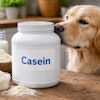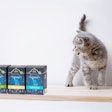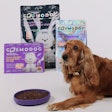As a functional ingredient, the future prospects for hemp-based products has arguably never been higher. Cannabidiol, or CBD, received an enormous amount of attention in 2018 when the Food and Drug Administration (FDA) approved the first human drug containing CBD for sale in the U.S. and that momentum has grown rapidly through the early months of 2019.
In part, more consumers are now learning about the difference between industrial and pharmaceutical hemp compared to “recreational” strains or those sold at marijuana dispensaries. Another factor is that CBD is appearing more frequently not just in select products for humans but also increasingly in supplements and treats for pets, according to market research firm Packaged Facts in the recent report U.S. Pet Market Outlook, 2019-2020.
“CBD-infused pet products are on pace to quickly go from niche to norm, spurred in part by the humanization trend and pet parents’ desire to see their fur babies live calm, comfortable lives,” says Sprinkle. “Already, numerous companies are involved in creating CBD products for pets. With the current trajectory, various industry experts confidently anticipate the number of active participants in the segment to double next year.”
Most of the CBD treats on the market come from companies that specialize in CBD products for people rather than pet-focused marketers. Among these is Honest Paws, which promotes its treats as “the #1 rated CBD dog treat” on its website; Canna-Pet treats, available in three varieties; Austin and Kat, with treats positioned as “healthy, calming, and restorative”; and Pet Releaf, whose Edibites are billed as a “superfood smoothie…an immune system turbo boost” (petreleaf.com). Pet specialists offering hemp-based treats (without specifically mentioning CBD) include NaturVet, Wet Noses, and Zesty Paws, all touting a range of benefits including immune system support and relief from stress, anxiety, allergies, and joint pain.
Packaged Facts found that these days when it comes to calming pets—and human beings—and treating any number of other ailments—CBD is where it’s at. The “pets as people” movement means taking better care of pets not just physically but emotionally, too, including when it comes to stress reduction. In Packaged Facts’ 2018 Pet Owner Survey, 85% of dog owners and 38% of cat owners agree that “My pet sometimes has anxiety/stress issues.” There is clearly a need, which has created more opportunities for CBD products in the pet market.
Though neither the FDA nor the Association of American Feed Control Officials (AAFCO) has approved CBD for use in pet products, such products are flooding the market while carefully advertised as supplements or treats. Although the lack of regulatory oversight may seem odd, in the pet market it is more or less par for the course in the case of pet supplements and functional treats, which have long inhabited a regulatory gray area between drug and food, notes Sprinkle.
To help fill the void—and offer product makers and retailers some assurance their products will not suddenly be banned at the state or Federal levels—the National Animal Supplement Council (NASC) fields a quality seal audit program and keeps in close contact with the FDA. Not surprisingly, the NASC is at the forefront of the push to help create a safe space in the pet market for CBD. Companies operating in the CBD segment of the pet market must remain mindful of the FDA’s current position that CBD is not allowed as an ingredient in foods, human dietary supplements or animal foods—such products may be unlawful and risk stop-sale orders.

















